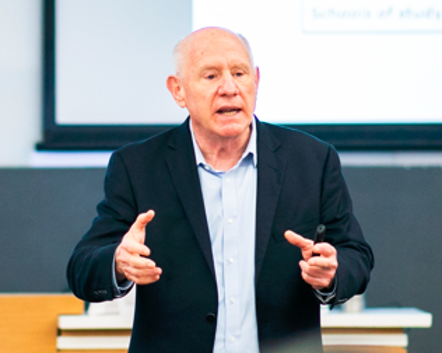By Alberto Najarro
Alberto Najarro ’22 talked with Dr. William (Bill) Winner, Professor of Environmental Science and common core subjects Global Challenges in Science, Technology, and Health at Duke Kunshan University (DKU) about Bill’s teaching experience and philosophy.
“Good morning students and welcome to class. Is [sic] there any concerns or announcements that students would like to address?”
This is Professor Winner’s signature greeting. Every student who has taken a class with Bill, as he encourages students to call him, would recognize this warm start of the class.
During the conversation with Bill, when asked about his distinctive way of starting his classes, he states that his job is to make sure that students are having a pleasant experience. For Bill, his role is not limited to teaching a lesson on the consequences of human activity in the planet or the nitrogen cycle. “It is also about listening to how they [students] feel and if they have something else in their heads that might distract them before starting the class,” he explains.
An Experienced Educator
Bill’s previous experiences can help to understand his personality and why he decided to join the inaugural group of professors at Duke Kunshan. When it comes to teaching and building a university’s curriculum, Bill is not a new-comer. Prior to his arrival to DKU, which he describes as “one of the most challenging, yet enriching experiences of my lifetime,” he formed the environmental science program at two major universities in the United States and obtained his B.A. and M.A.T. degrees in Biology, and an M.A. and a Ph.D.in Biology.
Throughout his years of teaching, he has learned that “if you have 40 students in a class and you give a presentation, you’re giving 40 different presentations.” He explains that “each person comes with a different background, set of language skills, issues…,” but that should not be seen as a barrier. Instead, he insists, being aware of those differences encourages him to adapt to his students’ needs and assure that they learn the material.
The Value of Clear Communication
That’s no surprise, given that for Bill, there is something that he considers to be invaluable—clear communication. At two of his previous universities, he developed a writing course, “but not any writing course.” In between laughs, he shares that after university “professionals are not paid for writing essays. What you do is write reports that have a purpose, a stated goal, some type of specific objectives.” Therefore, at DKU, Bill tries to emphasize the value of clear writing in every class that he teaches.
His passion for clear communication even led him to write a book titled A Handbook for Analytical Writing: Keys to Strategic Thinking. At one of the biweekly T&L at Lunch Series that the Center for Teaching and Learning (CTL) organizes throughout the academic year, Bill shared the five key instructions of science writing that sum up his book, including: (1) avoiding the usage of passive voice, (2) superlatives, (3) undefined pronouns (4) jargon, and (5) slang. “If a student avoids using those, they will send a clear message to the reader, especially if it is a scientific paper,” he said.
Reciprocal Love from Students
Former students are always eager to share their past experiences with Bill. For Cara Wu 吴菲 from Hubei, China, “It does not matter who you are, as long as you make eye contact with him, he will give a sincere smile and cordial greeting.” Christiana Claros from the Philippines agrees with Cara. “Despite his busy schedule as an instructor and a division head, Professor Winner never fails to make time to get to know his students and connect with them,” she said. “Professor Winner’s passion for teaching and promoting environmental science has inspired many students at DKU to pursue a career in environmental science,” she added. Both Cara and Christiana were enrolled in Bill’s “Introduction to Environmental Science” course.
Lingli Tang from Sichuan, China, describes herself as “fortunate” for having Bill as her professor in “Global Challenges in Science, Technology, and Health” course. She remarks, “Professor Winner is very caring about each student and passionate about his teaching at DKU…he has light, enlightening students’ paths and dreams.” Lingli also recalls one conversation she had with Bill in which “he shared to me that we need to work together in order to pursue a better future.”
Darwin’s Law of Natural Selection
Bill shares that he has “adapted” his teaching to the unique context of Duke Kunshan University. “It is important to keep in mind that English is not the majority of DKU students’ native language…but they still decided to come to a university in which everything is taught in that language,” he explains. “Sometimes it is necessary to stop in the middle of the sentence and make sure that they know the definition of a word that I just used.” Bill has emphasized that this and other measures guarantee students that they are in a learning environment, “We are all learning from one another, and if defining a word in the middle of a sentence or smiling and ending the class on a positive note will communicate my intentions to make everyone have a memorable learning experience, I’ll continue to do it.”
Faculty Introduction

Professor of environmental science, Duke Kunshan University
Dr. Winner’s research focus is in plant physiological and ecological responses to environmental change. His teaching interests at Duke Kunshan include integrated science, biology and environmental science, especially lifecycle analysis and systems thinking.
He has directed environmental science research centers and academic programs at Virginia Polytechnic Institute and State University, Oregon State University and North Carolina State University. He also worked in research administration at the U.S. National Science Foundation.
Winner has B.A. and M.A. teaching degrees in biology from the Lewis and Clark College, Portland, an M.A. in biology from the University of South Dakota, and a Ph.D. in biology from the University of Calgary, Canada.


